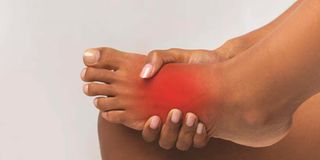How can I deal with gout through diet?

How can I deal with gout through diet? Photo | Photosearch
What you need to know:
The first food group that gout sufferers are told to avoid are the ones containing purines
Clinical Nutritionist Sona Parmar answers a reader’s question about gout.
Q: Recently, I have suffered from an extremely painful big toe. My doctor says it is gout and that diet can help. I would appreciate advice.
A: Despite the apparent genetic link (one in four gout sufferers has relatives who have gout as well), more women are getting gout nowadays, especially as we tend to eat richer foods while hydrating with the wrong fluids.
The first food group that gout sufferers are told to avoid are the ones containing purines (uric acid is a breakdown product of purines.). Foods to avoid include organ meats (such as liver and kidney), game meat, processed meat (pies, sausages etc), seafood (oily fish and shellfish), beans, peas, lentils and oats. Lean red meat, as well as poultry and white fish, are lower in purines, so are fine in moderation. Other foods to steer clear of include dried fruits, asparagus, cauliflower, spinach, mushrooms and anything very sweet.
Despite the restrictions on your diet because of the gout, you can still eat plenty of the other sorts of fruit and vegetables, berries (when you can get them) and celery are particularly good at reducing uric acid levels.
Lots of water is also important. Not only does it help to dilute uric acid, it can speed its elimination from the body. Nettle tea is also fantastic at promotes the excretion of uric acid.
That’s why alcohol is best avoided. Although red wine in moderation is good for heart health, it can also exacerbate gout, as does beer. If you succumb to the occasional glass of wine, make sure you drink plenty of water to help flush out the alcohol from your system. Interestingly, drinking too much alcohol, especially in "binge" patterns often seen in Nairobi, makes the likelihood of contracting gout much higher.
Of the various supplements that are often recommended, three spring to mind. First, the humble vitamin C: it helps release uric acid from the body's tissues and then speeds its excretion through urine. This vitamin is best taken in doses spaced throughout the day (500mg, three times a day), as single high dose can free up so much uric acid that a kidney stone may form. The second is an omega-3 supplement – these fish oils also reduce levels of inflammatory substances that cause tissue damage in gout. Look for a supplement containing at least 200mg each of EPA and DHA (the active components). The last is derived from the pineapple stem and is called bromelain - a great natural anti-inflammatory. Following an acute attack of gout, take one 500mg (2000GDU) tablet every three hours to relieve pain (between meals to improve its effectiveness).




